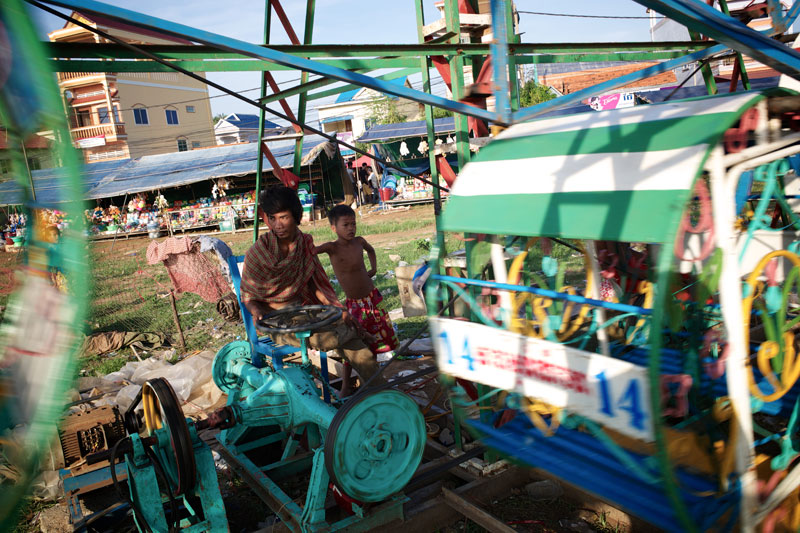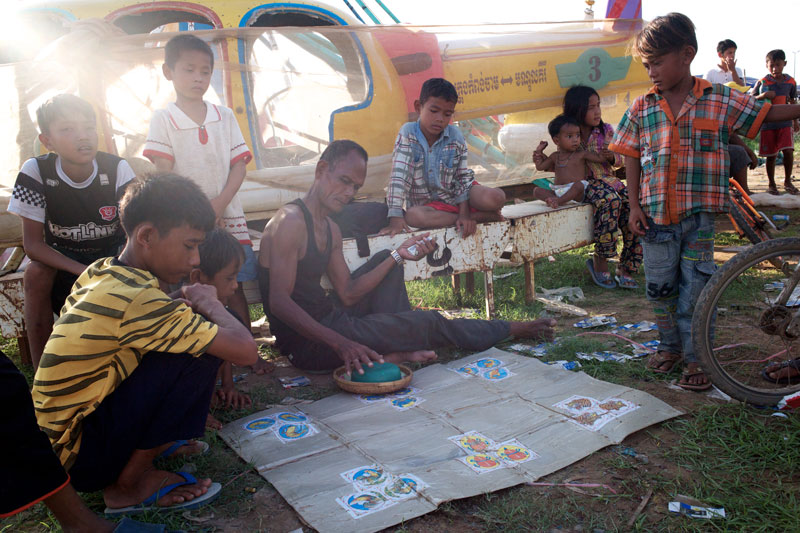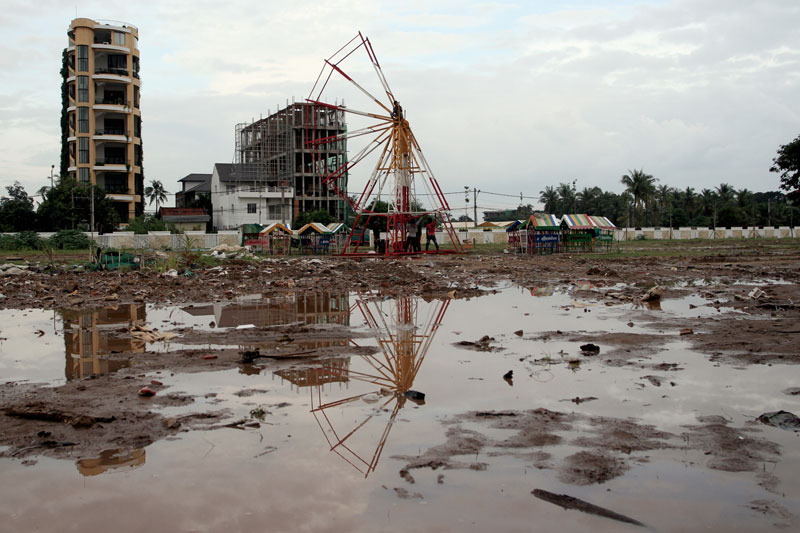The Water Festival is over. But for some, the party never ends.
As normalcy resumes after the three days of festivities, carnival workers from across the country who made homes in and around their rides and attractions on Phnom Penh’s Chroy Changva peninsula this past week are preparing to do it all over again.

Ferris wheels and bumper-car rinks are being dismantled and thousands of dollars worth of cheap prizes are being stowed away as these nomadic freestylers load their lives back into their rickety vehicles to hit the road once more.
“As soon as one festival is over, we pack up and go to the next,” said Kong Pheareak, 23, who operates a Ferris wheel and is part of a 38-person team of traveling showmen from Kompong Cham province.
Next stop: Memot district in Tbong Khmum province for a Kathin festival.
“We are always moving,” he said. “In one year, maybe we spend only three months at home —the rest, on the road.”
As the burning sun brought the makeshift carny camp to life on Thursday, Mr. Pheareak, swinging on a hammock strung between two spindly metal arms jutting out from his Ferris wheel, told of his life on the lam.
Like others interviewed in this transient community, Mr. Pheareak, with bleached-blond hair and a gleaming diamante tooth, enthused about an almost carefree lifestyle with considerable perks.
“The best thing is…it’s easy money doing this job,” he said. “Far easier than farming rice at home.”
Mr. Pheareak is employed by his aunt, who owns the Ferris wheel, six trampolines and the “best” bumper-car rink in the country, which are hauled around the country by a convoy of seven trucks. He receives a salary of $100 per month.
The Ferris wheel is a project of his own.

“We bought the materials and built it ourselves,” he said proudly. “In total, including the engine, it cost about $5,000.”
In hammocks attached to the contraption, two of Mr. Pheareak’s friends stirred and grunted, disturbed by the chatter—and less than joyous, he said, as a result of two cases of beer consumed between midnight and early morning.
“I never get sick of this job,” he said. “We can finish when we want and have our own fun, but usually, if we have customers, we keep going.”
Dozens of these evanescent carnival folk were still sleeping at 11 a.m. Thursday. Some slept under their rides, some slept in them. One middle-aged man woke in a bulbous pink car hanging from a merry-go-round, wiped his face with a krama and then got to work sweeping the rubbish away from the station where he sells his tickets.
Across the muddy park from the merry-go-round stood a raised stage for theatrical performances, ruby-red curtains concealing only part of a fairytale forest backdrop. The area in front was littered with filth left by last night’s crowd.
Underneath the stage, members of the performing troupe lay in their hammocks, some still sleeping but most awake, tapping on smartphones or gnawing on corncobs.
Among them was Eang Chanthan, 47, a flamboyant theater veteran with faded tattoos, a deep scar under his left eye and a gold-colored ring holding an outsized, purple imitation gemstone.
“Our group has become famous across Cambodia for our talent,” he said. “Whenever there are large events or ceremonies, the Ministry of Fine Arts calls and sends us to put on a show.”
Mr. Chanthan, whose wife and five children are also part of the traveling show, said he spends almost no time at his home in Takeo province.
“We spend seven to 10 days at home each month,” he said. “The rest of the time, we are going here, going there, to perform for the people.”

As his hammock swung over a pile of food waste that had accumulated over the past two days, Mr. Chanthan told of his beginnings as a performer.
“In 1984, when we were known as the People’s Republic of Kampuchea, the Ministry of Fine Arts sent people out to all the villages to share the knowledge about how to become a performer,” he said.
“Now I am able to play many roles: sad, angry, old man, action. And I can also sing at wedding ceremonies.”
Mr. Chanthan said that while he only has to perform about four hours per day, his job was not easy.
“When we perform, some people look at us and think, ‘Oh, it’s a very easy job to be a performer,’ but, no, it’s not easy. It takes talent to make the crowds laugh with us, to make them cry with us,” he said.
“I do love my job, but I wont let anyone say it is easy.”
While the flamboyant actor defended the difficulty of his carnival job, a couple much newer to the scene did the opposite.
Fed up with farming their small plot of land in Kompong Thom province’s Stung Sen City, Choeung Khorn, 34, and his wife Nuth Srey Oun, 33, took a gamble 18 months ago.
Mr. Khorn’s sister was a fixture on the carnival circuit, they said, setting up stalls where partygoers would pay 1,000 riel (about $0.25) for the chance to pop a balloon with a dart or knock over a stack of cans with a baseball and win prizes.
“My sister took us and showed us, ‘This is how you make money,’” Mr. Khorn said.
“Now, we have our own game and can make between $4 and $20 a day; sometimes we can make $30.”
The couple’s stall now holds more than $1,000 worth of prizes, they said, including bottles of whisky, toy trucks, laundry detergent, strawberry flavored milk and bedding sets.
“The blankets are the best prize,” Ms. Srey Oun said. “But you need to knock the cans over 15 times to win.”
The couple said that their new job on the carnival scene was fun, relaxing and lucrative, and allowed them to spend lots of time together. They didn’t have a single bad story to tell.
However, underneath their tarpaulin and behind the wall on which the inflated targets hung, a toddler cried out for attention.
“We have three boys,” Mr. Khorn said. “They are 13, 11 and 3.”
The couple explained how the two elder boys generally stay at their home in Stung Sen City, where they are watched over by relatives or neighbors, while the youngest boy travels with them everywhere. For the Water Festival, the 13-year-old, Choeung Sokhuoy, had come along for the ride.
“When I grow up, I want to be like my parents and work like this,” the boy said. But his parents interjected, explaining to him that they were trying to make money to send him to school, so he can land a more mainstream job.
“Since we started this job, we don’t see our sons a lot,” Ms. Srey Oun said, adding that the family returns home once every two or three months for a few days. “But we make this sacrifice so they can discover their own passion.”
As the first customer of the day rolled up, ready to pelt a baseball at the stack of cans, Mr. Khorn sprung into action, still dressed only in a brown krama.
“I love my lifestyle,” he said. “It is different but it is good.”
With the lively atmosphere again building, Mr. Khorn said that for carnies, the Water Festival is just another stop on an unending tour of the country.
“When it’s all over, we pack everything into the truck and go wherever the people are having a party,” he said.




